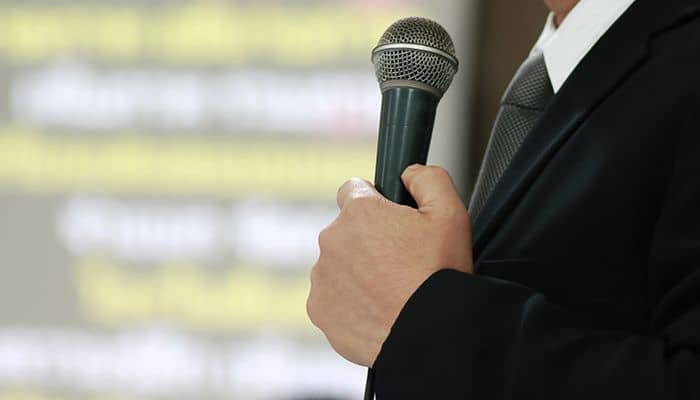Filler Words Are Speech Killers
Okay so…like…filler words are…umm…awful, you know?
It’s probably safe to say we all fall victim to filler words from time to time, especially when we’re feeling nervous or uncertain. And few people are as nervous and uncertain as when they have to get up and speak.
But have you noticed just how many filler words we use in our everyday conversations, too? We’ve developed a nasty habit of talking without first thinking through what it is we want to say, so our daily chats end up being a string of sentences tied together with “umms” and “uhhs” and (my favorite) “like.” If someone were to record you speaking and then transcribe it, how many times would the words “like” and “uh” appear? (Let me give you a hint: A LOT.)
Public Speaking Without Filler Words
Filler words are words that are spoken but not usually written, such as: “(um) I was (uh) thinking maybe we could (like) take a walk or (uh) something.” They are of no use or importance to the thought being expressed and a lot of times they will minimize the impact of what you’re trying to say. That’s bad enough in everyday conversations, but when it comes to public speaking, filler words make you sound completely unprepared and lacking confidence, too.
The good news is you can drop filler words from your vocabulary and sound much more polished.
Public Speaking Training Can Help
Filler words are usually substituted for a pause, and not many people even realize they’re doing it. The next time you speak to someone, pay attention to the number of times you drop an “umm” or an “uhh” without meaning to. And once you notice how many times you’re doing it, you’ll tune in to how many times other people do it, too. You’ll start to realize just how distracting those little words can be.
Powerful public speakers do not use fillers words because they know the negative effect they can have on their message. In our Public Speaking Classes workshops, we dedicate a good amount of time on how to avoid filler words, and it all starts with the Golden Rule of public speaking: practice.
If your thoughts are not organized and you aren’t sure what you want to say, filler words will run rampant. That’s why it’s so important to know your material inside and out and to practice, practice practice. Lack of preparation is the Number 1 reason people end up spewing filler words during a presentation. (Transitioning to a new thought is also a prime time for filler words to creep in, so practice your transitions, too.)
Filler Words in Speech: A Bad Habit
It’s also important to figure out where you most frequently use filler words. I recently watched a video online and noticed the spokesperson ALWAYS said, “And…um…” It was obvious this was a habit in her speech and not necessarily because she didn’t know what she wanted to say next. Her presentation was actually well thought out and she used very few other filler words. But every time she said “and” it was quickly followed with an “um.” After a while it started to get annoying.
Remember that silence is golden. If you need a moment to regroup or give yourself time to think, don’t say anything. Silence is a very effective public speaking technique—and it’s far more beneficial than filling spaces with unnecessary filler words, which can make you look nervous or unsure (and therefore not credible).
Speak when you’re ready. It may feel like a three- or five-second pause in your speech is too long, but it really isn’t. Think out your next statement before you start talking and you’ll notice the number of filler words you use will drop.
Do you find yourself using a lot of filler words in your presentations and everyday conversations? Do you notice when other people use them too? Tell us about it in the Comments section, or mention this blog on our Facebook, Twitter, LinkedIn or Google+ pages where we are always posting great tips and advice to improve your public speaking skills.


I have a nasty habit of using umm a lot. I never been one to use “like” but man I need to stop using umm. I feel like this is something people adapt to in school to get a grasp on their words and if the teacher doesn’t correct them, they never learn. I found good practice talking to a camera. Recording myself talking about anything.
I’ve been listening more closely to how many filler words I use. It’s a hard habit to break. Thanks for the advice.
Thank you! Filler words are a huge distraction in a presentation. I wish more people would read this
So much yes! Great advice!
I never realized how many filler words people use when they talk until now. Great article.
Filler words are so irritating. It’s a bad habit that everyone needs to get rid of if they want to be taken seriously.